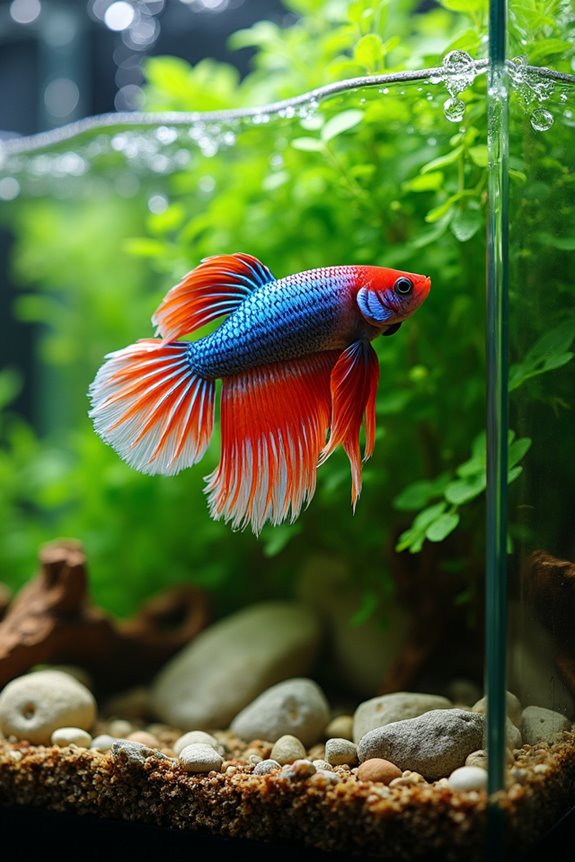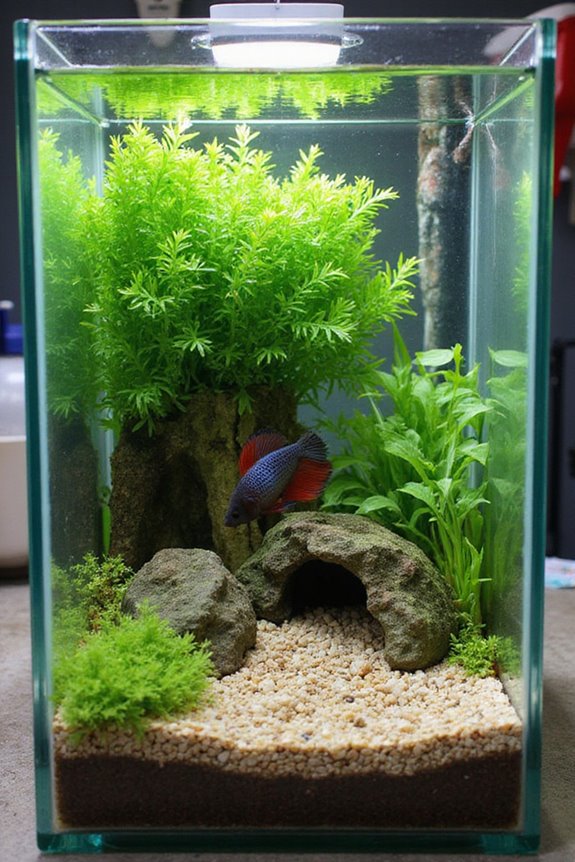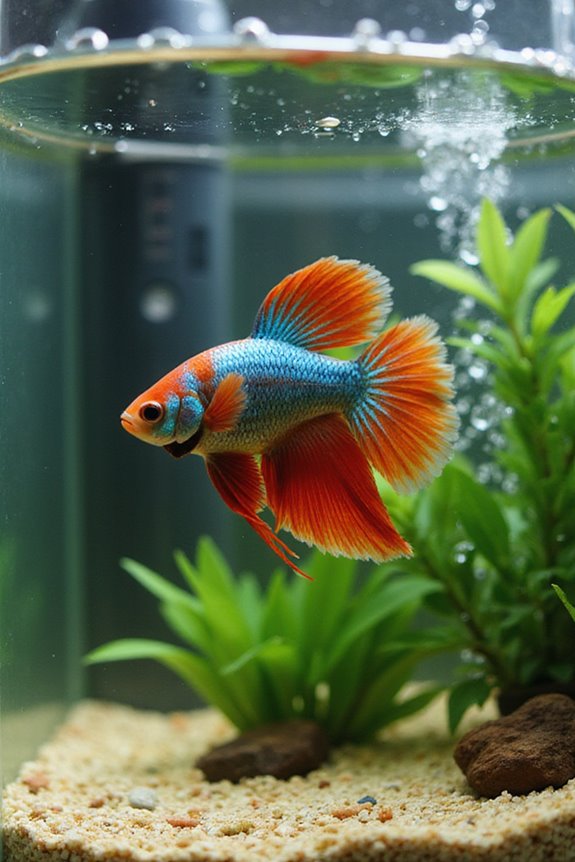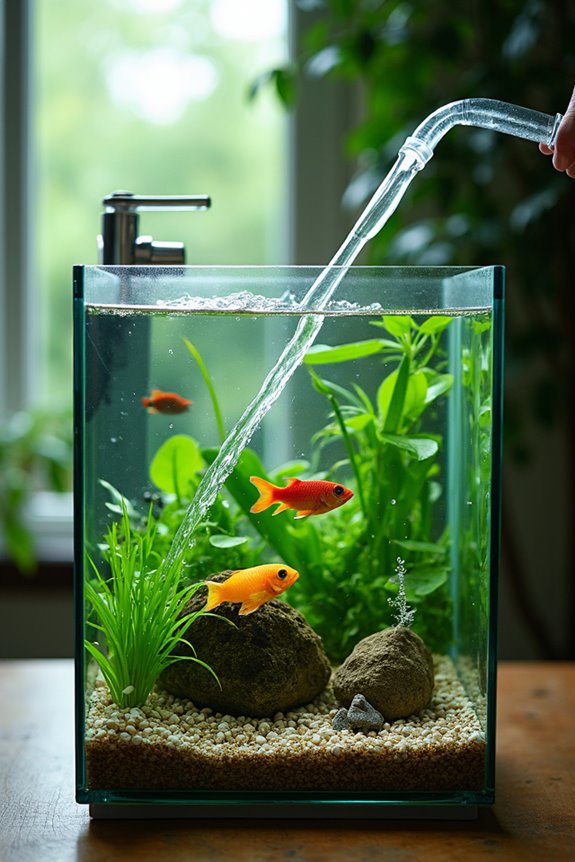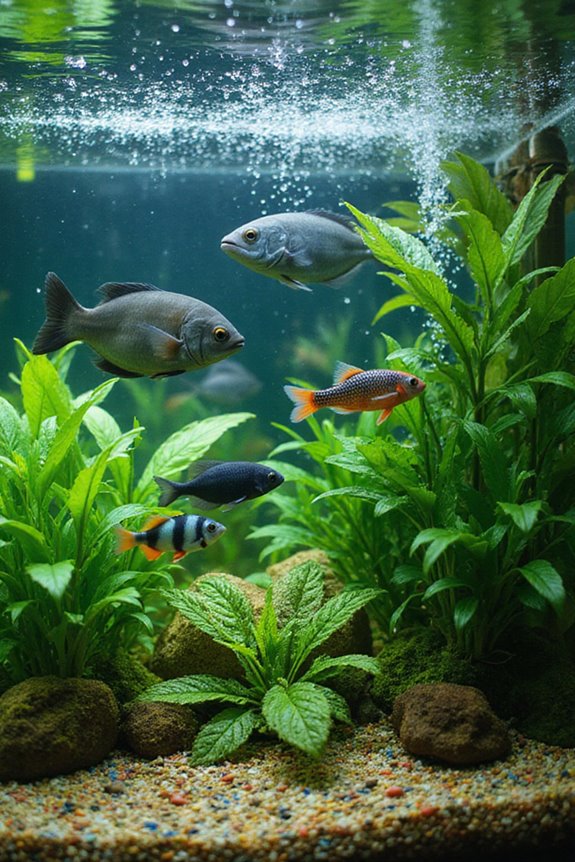Betta fish do need a filter for ideal health. Filters help maintain clean water by removing toxins and debris, promoting stable ammonia and nitrate levels. They also support beneficial bacteria, ensuring proper biological filtration. Without a filter, waste accumulates quickly, increasing disease risks. However, choose a gentle filter to avoid strong currents, which Betta fish dislike. Regular maintenance of filter media is essential. If you want to learn more about tank setups and alternatives, keep exploring.
Key Takeaways
- Betta fish benefit from filters as they maintain stable water parameters by removing toxic ammonia and nitrite, promoting overall health.
- Filters facilitate oxygen exchange and prevent stagnant water, reducing stress and enhancing Betta fish respiration.
- Without a filter, toxic waste accumulates quickly, increasing the need for frequent water changes and the risk of human error.
- Some filters can create strong currents that are unsuitable for Betta fish, which prefer calm water environments.
- Regular maintenance of filters is crucial to ensure optimal performance and to prevent water quality deterioration.
Importance of Clean Water for Betta Fish
When it comes to keeping Betta fish healthy, clean water is essential. Maintaining water stability in your tank is vital for their well-being. Ideally, a tank size of at least 5 gallons is recommended, as larger volumes help regulate water parameters better. Regularly check ammonia and nitrate levels; both should be at 0 ppm and under 20 ppm, respectively, to prevent disease. Using water conditioners before adding water removes harmful chemicals and helps maintain mineral balance. Consistent partial water changes, around 25% biweekly for filtered tanks, reduce stress and improve disease prevention. Remember, stable conditions promote overall health, so monitoring your Betta’s environment will lead to a longer, healthier life. Adding aquarium decorations like hollow tree trunks can provide essential hiding spots for your Betta while enhancing the aesthetic appeal of your tank.
How Filters Function and Their Benefits
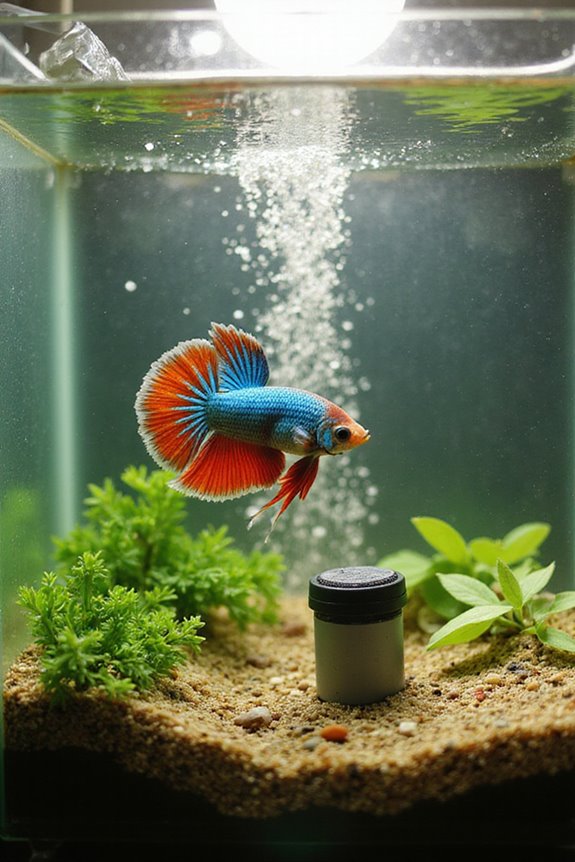
Understanding how filters function in an aquarium is vital for maintaining a healthy environment for Betta fish. Filters provide mechanical filtration, which removes debris and particulate matter by trapping solids in the filter media. This process improves water clarity and simplifies tank maintenance by eliminating uneaten food and waste.
Additionally, biological filtration supports the growth of beneficial nitrifying bacteria, converting toxic ammonia and nitrite into less harmful nitrate. This helps stabilize the aquarium ecosystem and maintains a sustainable environment for your Betta.
Choosing the right filter, like a hang-on-back or sponge filter, can also guarantee gentle water movement, catering to Betta preferences. Many automatic filters feature moisture-proof technology that prevents food from becoming wet or jammed, which is essential for maintaining food quality when using automatic feeders. Regular maintenance of filter media is important for ideal performance and long-term health of your tank.
Risks of Not Using a Filter
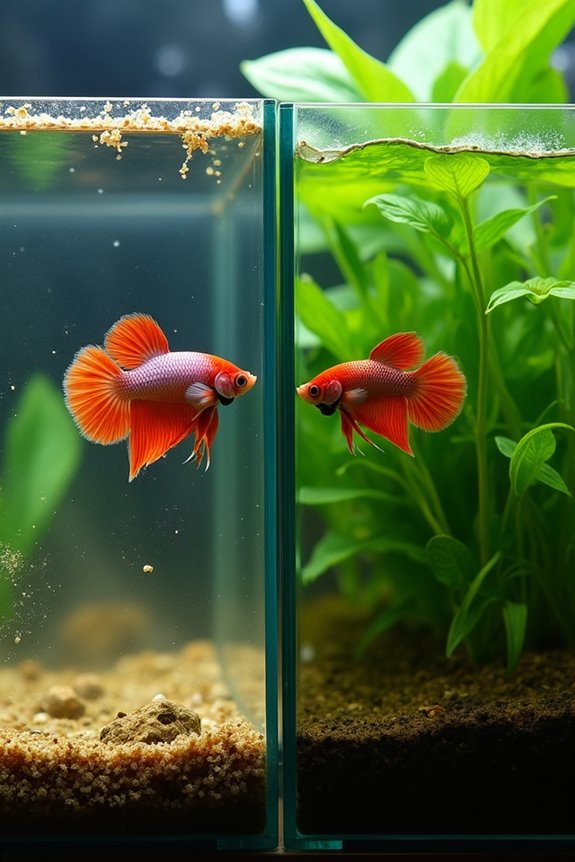
The absence of a filter in a Betta fish tank can lead to significant risks that affect both water quality and fish health. Without filtration, toxic waste accumulates quickly, raising ammonia and nitrite levels, which can impair gill function and stress your fish. Bacterial growth flourishes in stagnant water, increasing the chances of infections like fin rot and ich. Poor water conditions create stress factors that reduce appetite and shorten lifespan. Maintenance challenges arise as frequent water changes become necessary, increasing the risk of human error. Additionally, tank limitations restrict you to smaller setups, which can’t support tank mates or plants without filtration. Similar to how low-stretch lines enhance sensitivity when ice fishing, a proper filter improves your ability to detect and respond to water quality issues before they harm your Betta. Ultimately, your Betta’s health depends on maintaining safe and stable water quality.
Maintaining a Betta Tank Without a Filter
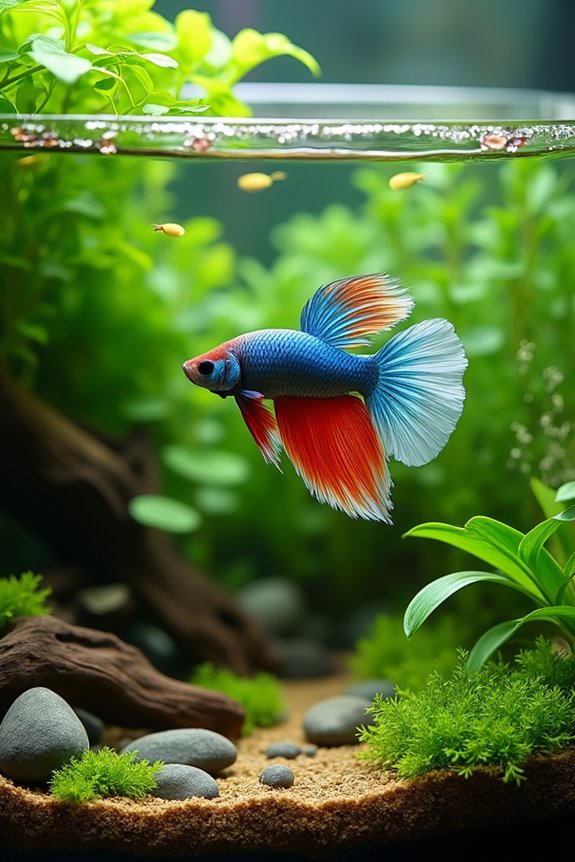
Maintaining a Betta tank without a filter requires careful attention to water quality and routine maintenance. I change about 25-50% of the water weekly or biweekly to control toxins. Using dechlorinated water is essential to protect my bettas. I remove uneaten food and debris before each change, which helps reduce ammonia buildup. For tank cleanliness, I gently scrub the walls with an aquarium-safe brush and clean the gravel every 4-5 weeks. I also wash ornaments under tap water, avoiding soap. Regularly testing ammonia, nitrite, and nitrate levels keeps conditions stable. I monitor my bettas’ behavior daily, looking for signs of stress. With consistent care, I can maintain a healthy environment for my fish without a filter.
Advantages of Using Filters for Betta Fish
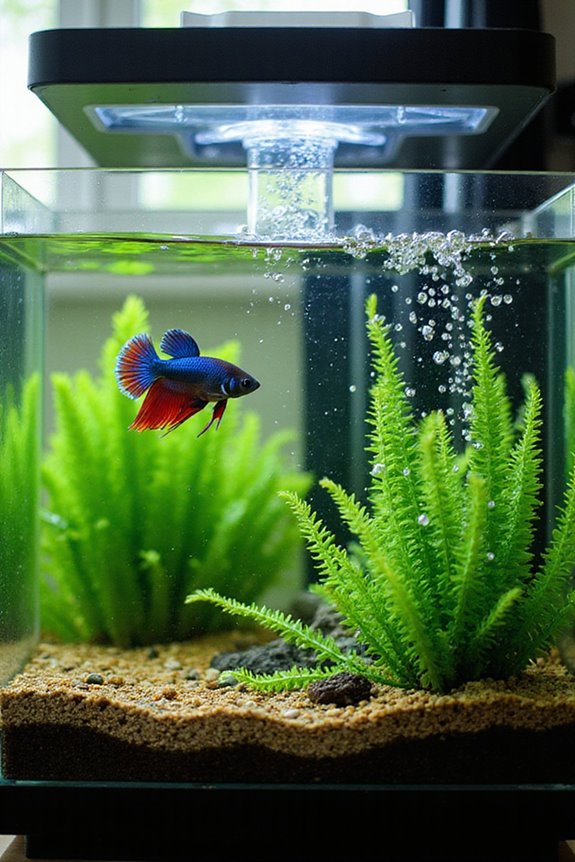
Using a filter in a betta tank can greatly enhance the overall health and well-being of your fish. Filters, like sponge or canister types, efficiently remove waste, including excess food and fish feces, keeping water parameters stable. They help eliminate toxic ammonia, essential for betta health, and reduce harmful bacteria buildup. Furthermore, filters promote oxygen exchange, ensuring your betta has the oxygen needed for ideal respiration. This constant water movement prevents stagnation, which can lead to stress. Additionally, a biological filter provides space for beneficial bacteria to thrive, naturally detoxifying waste and maintaining consistent water quality. Using filters also simplifies maintenance, reducing the frequency of water changes and keeping the tank clean, benefiting both you and your betta.
Potential Drawbacks of Aquarium Filters
While filters offer numerous benefits for betta fish tanks, it’s important to recognize the potential drawbacks that come with their use. One significant issue is filter sizing; a filter that’s too large can take up valuable space in smaller tanks, limiting swimming room for your betta. Additionally, many filters generate filter noise, which can be disruptive to both you and your fish, potentially causing stress. Regular maintenance is essential, as filters can malfunction if not properly cared for, leading to water quality issues. Finally, filters can create strong currents that are unsuitable for bettas, which are not strong swimmers. As a result, considering these factors is vital when deciding on a filtration system for your betta fish tank.
Choosing the Right Filter for Betta Tanks
Choosing the right filter for your betta tank is vital, especially since these fish are sensitive to water conditions. Several filter types cater to bettas, such as submersible filters like the Cascade 300, which allow customization of filter media. Hang-on-back (HOB) filters, like the Bio-Wheel Power Filter, are popular for their ease of maintenance and effective filtration. It’s important to select a filter with an adjustable flow rate, ideally between 5 to 15 gallons per hour, to prevent stress from strong water flow. Specialized options like the Top Fin® BETTAFLO™ Filter provide gentle water movement, minimizing current disturbances. Confirm the filter size matches your tank volume, especially if you have a smaller setup of 2.5 to 5 gallons.
Filter Maintenance and Best Practices
Maintaining a clean and functional filter is essential for the health of your betta fish, as it directly impacts water quality and overall tank conditions. I recommend testing water parameters weekly to monitor ammonia, nitrites, and nitrates. For filter media, rinse it in tank water during water changes to preserve beneficial bacteria. Aim for a maintenance frequency of monthly media replacement and weekly substrate siphoning to remove waste. Use gentle cleaning techniques, avoiding soap or chemicals. Implement algae control by using magnetic scrapers on the glass and monitoring nutrient levels. Always handle equipment safely, inspecting filters daily for blockages. Following these practices guarantees a thriving environment for your betta, enhancing their health and longevity.
Alternatives to Filtration for Betta Care
When considering alternatives to filtration for betta care, it’s important to recognize that maintaining water quality is still achievable without traditional filtration systems. Sponge filters are an excellent option, providing gentle mechanical and biological filtration while promoting beneficial bacteria growth. I recommend performing manual maintenance, including regular partial water changes of 20-30% weekly, to reduce waste. Oxygenation methods like air stones help increase oxygen levels without strong currents, which bettas dislike. For tank size, I suggest using at least a 5-gallon tank to guarantee stable water chemistry. Incorporating live plants can enhance filtration naturally while also offering hiding spots. Remember, monitoring water parameters daily is vital for a healthy environment in filterless setups.
Assessing Your Betta’s Needs and Environment
Evaluating your betta’s needs and environment requires careful consideration of several factors to guarantee their health and well-being. First, I monitor the water temperature, keeping it between 75°F and 81°F. This range helps prevent inactivity and diseases. Next, I focus on tank size; a minimum of 5 gallons is ideal for maintaining stable water conditions. In smaller tanks, fluctuations become more pronounced, increasing stress on the fish. I also make sure the water quality stays at its best by keeping the pH between 6.5 and 7.5. Regular testing for ammonia, nitrite, and nitrate levels is vital, as is having plants or decorations to provide hiding spots. Remember, a secure lid is essential since bettas are jumpers.
Frequently Asked Questions
Can Betta Fish Survive in a Bowl Without a Filter?
I’ve found that betta fish can survive in a bowl without a filter, but the bowl size and water quality matter. Regular cleaning is essential, or their health will decline quickly. It’s a delicate balance.
What Type of Filter Is Best for Betta Fish?
When choosing a filter for my betta, I focus on filter size and type. I prefer submersible or sponge filters with adjustable flow rates, ensuring my betta stays comfortable and stress-free in its environment.
How Often Should I Clean My Betta’s Filter?
Cleaning my Betta’s filter feels like maintaining a garden; I check it every two weeks to guarantee ideal water quality. Regular filter maintenance keeps the tank thriving, just like watering plants keeps them vibrant and healthy.
Do Bettas Prefer Quiet or Noisy Filters?
I’ve noticed that my betta definitely prefers quiet filters. Excessive filter noise can stress them, affecting their behavior. A calm environment helps my betta thrive, making quieter setups essential for their well-being and happiness.
Can I Use a Sponge Filter for My Betta Tank?
Did you know that over 70% of betta owners prefer sponge filters? I’ve found sponge filter benefits, like gentle filtration and easy sponge filter setup, make them perfect for keeping my bettas happy and healthy.

